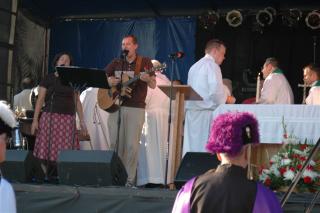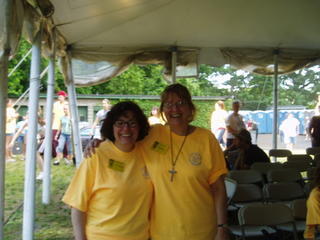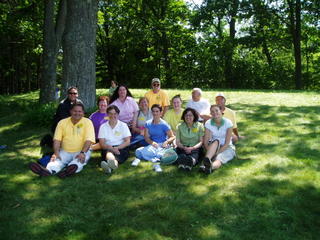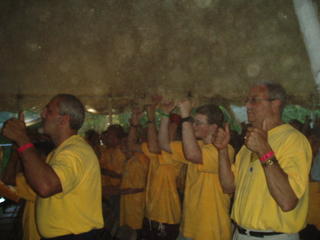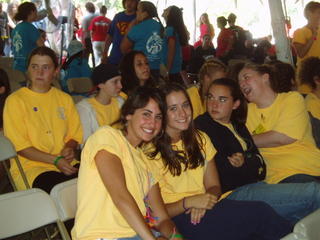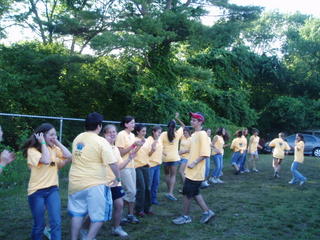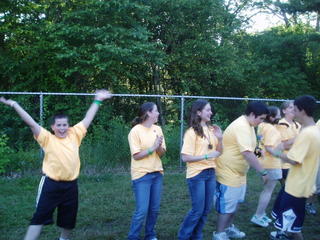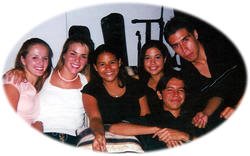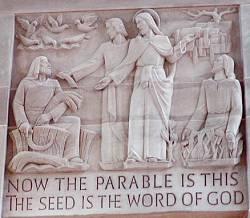(Eighteenth Sunday of the Year (A): This homily was given on
What’s on the list is important, but what’s not on the list is just as important.
I pointed this out a couple of weeks ago in a letter I wrote to the editor of the
She said (and here I quote): “Planned Parenthood has always embraced a culture of life that celebrates the rich diversity of the human family and sees all human beings regardless of gender, ethnicity, sexual preference, ability, or socio-economic status—as deserving of an equal place at life’s table.”
In my letter to the editor I offered this brief comment on Ms. Inocencio’s statement: “The discerning reader will notice that one crucial category was left off her list: age. One who is truly pro-life believes that human beings of every age—from conception until natural death—deserve the opportunity to sit at the table of life with the rest of us.”
What was on Miriam Inocencio’s list (gender, ethnicity, etc.) was important, but what was left off her list (namely, age) was just as important!
This same principle applies to our second reading today, this beautiful text from Romans 8, where
He answers his question with a long list of possibilities: anguish, distress, persecution, famine, nakedness, peril, the sword, death, life, angels (specifically bad angels), principalities (that was one class of angels), present things, future things, [evil] powers. Knowing that some people might have mistakenly embraced the lie of astrology, he even uses two astrological terms, height and depth.
His point is that none of these things—real or imagined—can separate us from the love of God that comes to us in Jesus Christ.
To that we should all shout, “Alleluia!”
But remember: what’s on his list is important, but what’s not on it is just as important.
Paul gives us a long list of realities which—thanks be to God—do not in and of themselves separate us from God and his love. And we all need to take his words seriously. We may think, for example, that our sufferings somehow disconnect us from the Lord, but they do not. Paul is adamant about that. In fact, if we respond to them in the right way, our crosses can actually lead us into a deeper relationship with God. No doubt some of you in this church right now are living testimonies to this truth. Because of a past suffering (the death of a loved one, perhaps), you’ve returned to the Church and to the practice of your Catholic faith.
But there is one reality that
Wrong!
Paul says that no suffering, no angel, and no other cosmic force can separate us from God’s love; he doesn’t say that our sins don’t separate us from God, because they do!
Here, of course, I’m talking about mortal sins. Venial sins weaken our love for God, but they don’t separate us from the Lord completely. And for that we should be grateful, since we all commit venial sins every day!
Now here’s where it gets confusing for many people, which is why we priests are often asked the question, “What’s a mortal sin?” In other words, “Which sins are considered to be mortal?”
Well, first of all, we need to remember that there are 3 conditions for committing a mortal sin: grave matter (in other words it must be something serious), sufficient knowledge (we must know it’s wrong and understand its severity), and full consent of the will (you can read about these in paragraph 1857 of the Catechism of the Catholic Church).
The last 2 conditions—sufficient knowledge and full consent of the will—need to be evaluated on a case to case basis; but grave matter is different. Grave, serious matter is pretty easy to identify.
On that note, a priest gave a Lenten mission at
I should also make mention of the fact that is not an exhaustive list; however it does include many of the more common mortal sins that are committed in modern American culture. And just in case you’re wondering, they’re listed here in alphabetical order:
Abortion (which includes the doctors and nurses involved, as well as those who directly assisted the woman in procuring the abortion: e.g., the doctor who referred her for the abortion, those who actively encouraged her to have the abortion, those who drove her there and those who paid for it.)
Adultery
Artificial Birth Control (including non-therapeutic sterilization procedures like vasectomies and tubal ligations, which, in essence constitute permanent birth control!)
Blasphemy
Calumny (telling lies about another person which seriously harm their reputation)
Despair (believing that God won’t or can’t forgive you for a serious sin)
Detraction (telling someone’s faults to others with the intention of ruining their reputation.)
Drug Abuse
Drunkenness
Excessive gambling
Excessive materialism
Hatred (Remember,
Homosexual actions
In vitro fertilization (or any other reproductive technology which replaces the marital act.)
Masturbation
Missing Mass on a Sunday or Holyday without good reason
Murder
Occult Activity (ouija boards, tarot cards, séances and the like)
Premarital sex (including the type that a former president wasn’t too clear about)
Presumption (i.e., sinning seriously and then having the attitude that God MUST forgive you)
And last—but certainly not least—receiving Communion with any of these sins on your soul!
The next time you examine your conscience in preparation for Confession, make sure these sins are on your list when you come into the confessional—if you’ve committed them. If they’re not, and you deliberately don’t confess them, then, sadly, you take them with you as you go out the door of the reconciliation room. You come in with them, and you go out with them! And that’s a tragedy even greater than the sins themselves.
Bishop Sheen understood this quite well, which is why he used to say, “Sin is really not the worst thing in the world. The worst thing in the world is the denial of sin! Because if I deny that I’ve committed certain serious sins in my life, how will I ever be forgiven for them?”
What will separate us from the love of Christ? Neither anguish nor distress nor persecution (nor any of the other negative things
But neither will our sins! Yes, they can separate us from the love of the Lord (as I’ve noted in this homily), but they won’t—if we acknowledge them, repent of them, confess them, and are absolved of them.
And that, I would say, is the greatest news of all!




